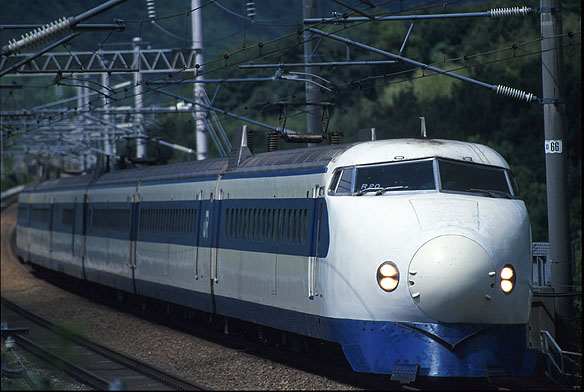0-1000series
-0 subseries
-1000 subseries
-2000 subseries
Unit formation
Type index
Photos

"0 series Hikari" revival |

R set in original livery
|
Superannuated 0 series vehicles, which have used from the start of operations on the Tokaido Shinkansen, began to be replaced with newly built 0 series classified into -1000 sub-series. 0-1000 series differs from previous 0 series vehicles in having small windows for each seating bay. The traction system was also different from that of previous 0 series. 26 type intermediate cars have the space for vending machines selling drinks. This space was changed into the room for train crews in later batches. The buffet counter became small and the buffet cars were classified into 37 type, because the restaurant cars delivering full service were included. The buffet counter was extended again and classified into -1500 sub-series in 1979.
0-1000 series vehicles are coupled with previous 0 series vehicles because
0-1000 series were built in order to displace superannuated 0 series vehicles.
3 formations named N sets consisted of only -1000 sub-series vehicles including
restaurant cars and buffet cars.
Seats in standard class are switchable, and those in first class are adjustable
reclining. Seat pitch is 960mm in standard class, and 1160mm in first class.
Standard class accommodation is changed into upgraded simple reclining
seats, which are two-position "slide-and-recline" type. Unlike
the two-abreast seats, the three-abreast seats do not rotate, and so are
arranged facing away from the center of the car.
After the splitting of the former Japanese National Railways (JNR) into the new privatized JR companies in April 1987, JR West delivered the refurbished 0 series featuring 2+2 abreast seating, and classified into -5000 sub-series. These vehicles entered "West Hikari" services linking Shin-Osaka and Hakata. The other 0 series vehicles were refurbished with new internal trim, rotating seats and new toilets/washing facilities. 0 series used on "West Hikari" services were displaced with 700-7000 series in 2000. Surplus 0-5000 series gradually replaced the remaining unrefurbished 0 series vehicles used on "Kodama" services.
Although 0-1000 series were used on "Kodama" services after withdrawing
"Hikari" services, 0-1000 series were gradually displaced with
100 series vehicles. Unrefurbished 0-1000 series vehicles were withdrawn
in March 2005. Refurbished 0 series were repainted into the new JR West
Kodama livery since May 2002 and had been used on "Kodama" services.
The last remaining 0-1000 series vehicles were withdrawn in 2005. |
|
| Technical Data |
| Items |
Data |
| Built |
1976-1980 |
| Construction |
Steel |
| Formation |
4M, 6M,
12M, 16M |
| Supply
voltage |
25,000VAC,
60Hz |
| Service
speed, etc. |
Acceleration:
0.96km/h/s Service speed: 220km/h |
| Length |
25,150mm
(End cars) 25,000mm (Intermediate cars) |
| Width |
3,383mm |
| Height |
3,975mm |
| Bogie |
DT200A |
| Collector |
PS200 Cross-arm
(8 per 16-car train) |
| Traction
motor |
MT200B (185kW) |
| Gear ratio |
2.17 |
| Transformer |
TM201 |
| Rectifier |
RS200A |
| Controller |
CS46 |
| Air conditioner |
AU56 |
| Designed
by |
Japan National
Railways |
|
|



